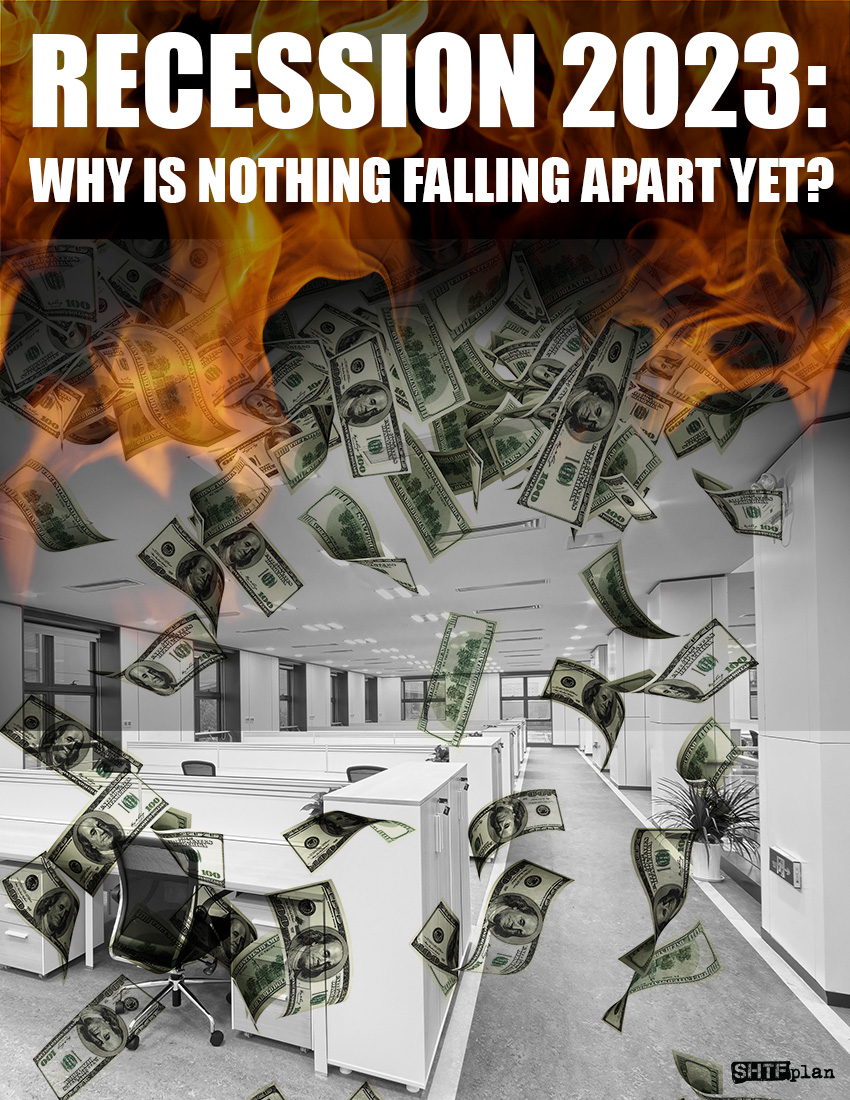
TRUMP SAYS: HUNTER MAKES FORTUNE FROM SHADY DEALS!
BIDEN FAMILY STINKS TO HIGH HEAVENS OF CORRUPTION!
DON'T GET LEFT OUT: HUNTER MUST BE STOPPED!

This article was originally published by Brandon Smith at Alt-Market.com
![]()

Normalcy bias is a rather horrifying thing. It is so frightening because it is so final; much like death, there is simply no coming back. Rather than a physical death, normalcy bias represents the death of reason and simple observation. It is the death of the mind and cognitive thought instead of the death of the body.
Ever since the derivatives collapse of 2008 the public has been regaled with wondrous stories of recovery in the mainstream to the point that such fantasies have become the “new normal”. These are grand tales of the daring heroics of central bankers who “saved us all” from impending collapse through gutsy monetary policy and no-holds-barred stimulus measures.
Alternative economists have not been so easy to dazzle. Most of us found that the recovery narrative lacked a certain something; namely hard data that took the wider picture into account. It seemed as though the mainstream media (MSM) as well as the establishment was attempting to cherry-pick certain numbers out of context while demanding we ignore all other factors as “unimportant.”
We just haven’t been buying into the magic show of the so called “professional economists” and the academics, and now that the real and very unstable fiscal reality of the world is bubbling to the surface, the general public will begin to see why we have been right all these years and the MSM has been utterly wrong.
Mainstream economists have done absolutely nothing in the way of investigative journalism and have instead joined a chorus cheerleading for the false narrative, singing a siren’s song of misinterpreted statistics and outright lies drawing the masses ever nearer to the deadly shoals of financial crisis.
Why do they do this? Are they part of some vast conspiracy to mislead the public?
Not necessarily. While central banks and governments have indeed been proven time and again to collude in efforts to cover up financial dangers, most economists in the media are simply greedy and ignorant. You have to remember, they have a considerable stake in this game.
Many mainstream economists tend to have sizable investment portfolios and they base their careers partly on the successes they garner in the annual profits they accumulate playing the equities roulette. They also have invested so much of their public image into their pro-market and recovery arguments that there is no going back. That is to say, they have a personal interest in using their positions in the media to engineer positive market psychology (if they are able) so that their portfolios remain profitable. Not to mention, their professional image is at stake if they ever acknowledge that they were wrong for so long about the underlying health of the real economy.
This atmosphere of deluded self interest also generates a cult-like collectivist attitude. There is a lot of mutual back scratching and mutual ego stroking in the MSM; a kind of inbred conduit of regurgitated arguments and unoriginal talking points, and people in the club rarely step out of line because they not only hurt their own investment future and career, they also hurt everyone in their professional circles. Meaning, no more cocktail party invitations to the Forbes rumpus room…
This is not to say that I am excusing their self interested lies and disinformation. I think that many of these people should be tarred and feathered in a public square for attempting to dissuade the public from preparing in a practical way for severe economic instability. I do not think they see themselves as being responsible to the people who actually take their nonsense seriously and their attitude needs adjustment. I am only explaining how it is possible for an entire profession of supposed “experts” to be so wrong so often. Mainstream financial analysts WANT to believe their own lies as much as many in the public want to believe them.
Like I said, normalcy bias is a rather horrifying thing.
One of the root pieces of disinformation in the mainstream that feeds all other lies is the disinformation surrounding falling global demand. MSM pundits cannot and will never fully admit to the cold hard reality of collapsing demand within the global economy. If they are forced to admit to falling demand, then the facade of a steady or recovering U.S. economy crumbles.
I covered the facts behind falling global demand for raw goods and consumer goods last year in part one of my six-part article series, ‘One Last Look At The Real Economy Before It Implodes.’The hard evidence and numbers I presented have only become more important in recent months.
For example, U.S. inventories are building and freight shipments are declining in the U.S. as retailers cite falling demand for goods as the primary culprit. Official retail sales numbers for the holiday season of 2015 have come in flat. When one takes into account real inflation in prices, consumer sales are actually far in the negative. According to the more accurate methods the U.S. government used to use in their calculations of CPI in the 1980’s, we are looking at annual price inflation rate of around 7%. Price inflation does not necessarily equal improved sales.
Energy usage has been crushed since 2008. Despite a growing population and supposedly a growing economic system, oil consumption in 2014 according to the World Economic Forumdropped to levels not seen since 1997.
This is the exact opposite of what should be happening and it is the opposite of mainstream projections for oil consumption made back in 2003. This is why inventories and storage for oil across the globe are reaching capacity in a manner never seen before. American demand for oil is not growing exponentially as expected because Americans cannot afford to support such growth anymore. Falling energy demand at these extreme levels is an undeniable indicator of a failing economic system.
Of course, mainstream economists in their desperation to keep market psychology rolling forward and the equities casino producing profits seek to spin this problem as an “oversupply” issue rather than a demand issue. And this is where the disparity in their arguments begins to bleed through.
Here is the problem presented in the mainstream; what came first, the chicken or the egg? Did falling demand lead to oversupply and thus a fall in prices? Or, is demand remaining steady and is overproduction the cause of falling prices? Yes, let’s confuse the issue instead of looking at the obvious.
As already linked above, it was falling demand which came first in 2008, and demand which continues to fall in relation to past trends. Have producers failed to reduce oil production to match falling demand? Yes. But this does not change the fact that oil demand today is well below levels needed to sustain the kind of economic growth markets have come to expect. Mainstream economists attempt to distract by hyper-focusing on supply, or twisting the discussion into an either/or scenario. Either it is a supply problem, or it is a demand problem, and they assert it is only a supply problem. This is not reality.
In fact, both can and often do exist at the same time, though one problem usually feeds the other. Falling demand does tend to result in oversupply in any particular sector of the economy. The bottom line, however, is that in our current crisis demand is the driving force and supply is a secondary issue. Supply is NOT the driving force behind the volatility in oil markets. Period.
This same chicken and egg distraction rears its ugly head in discussions on shipping markets as well.
The mainstream claim that the historic implosion of the Baltic Dry Index is nothing more than a problem of “too many ships” operating in the cargo market has been throttled, dissected and debunked so many times that you would think that it is surely dead. But the lie just will not die.
Mainstream propaganda houses like The Economist and Forbes continue to produce articles on a regular basis which deny the issue of falling demand for raw goods and claim that oversupply of vessels is the root cause of the BDI losing around 98 percent of its value since its highs in 2008.
I haven’t seen any of these articles offer actual stats or evidence to back their claims that oversupply of ships is the culprit and that demand is not a legitimate issue. But beyond that, why does the mainstream seem so hell bent on dismissing the BDI as a reliable economic indicator? Well, because shipping rates fall when demand falls, thus, when the BDI falls, it signals a lack of global demand. This is a fact they refuse to accept. When the BDI falls by 98 percent since the 2008 highs preceding the derivatives crisis, this signals a disaster in the making.
So, let’s stamp out the “too many ships came first” disinformation once and for all, shall we?
Shipping companies like Maersk Lines have already publicly admitted that falling global demand is the core problem behind falling rates and that supply is a secondary driver. They view the current financial crisis to be “worse than 2008”.
The fact that the largest shipping company in the world is warning of falling demand does not seem to be having any effect on the mainstream talking heads, though.
So, what do major shipping companies do when demand is falling and too many ships are operating on the market? Do they field those ships anyway and drive rates down even further? No, that makes no sense.
What companies do is either leave ships idle in port or scrap them. According to BIMCO (Baltic And International Maritime Council), 2015 was the busiest year since 2012 for the scrapping of older ships to make way for new arrivals. This process of scrapping ships or storing them idle destroys the argument that too many ships are driving falling rates in the BDI. In fact, as chief shipping analyst Peter Sand of BIMCO stated last year:
“The increase in Capesize scrapping comes at a much needed time for the market. Looking at the development so far this year the fleet growth has actually been negative, with a reduction of 0.8 %.”
I hope the garbage peddlers at Forbes and The Economist caught that — NEGATIVE growth of ship supply, not massive over-growth of ship supply. The scrapping increase was also across the board for other models of ships, not just the Capsize, and the increase of cargo capacity by new ships has been negligible. Yet, shipping rates continue to plummet to historical lows. Only falling demand, as Maersk Lines admits, explains the crash of the BDI in light of this information.
China in particular has been offering considerable incentives to those companies that do scrap older ships, to the point that some are even scrapping semi-new ships in order to cash in.
Now, this is not to say there is not an “oversupply” of ships. There are indeed many ships within cargo fleets that are not in operation. But again, this is because demand has declined so completely that even with increased scrapping and idling, shipping companies cannot keep up. Falling demand OCCURRED FIRST, and oversupply is nothing more than a symptom of this root problem.
So, mainstream hacks, can we please put the “too many ships” nonsense to rest and get on with a real discussion on obvious issues of demand? Stop focusing on the symptoms and examine the cause for once.
These are just a few of the hundreds of fundamental problems plaguing the global economy today, and they are all problems that the mainstream continues to ignore or dismiss out of hand. Which brings us to the now accelerating volatility in stock markets.
Stock markets are crashing, there is no other way to paint it. They are crashing incrementally, but crashing nonetheless. When you have violent swings in equities and commodities between 5 percent and 10 percent a day, then something is very wrong with your economy and has been wrong for some time. If global consumption and demand were really steady or growing, then you would not see the kind of systemic backlash in the financial system that we are now seeing. If companies listed on the Dow were making legitimate profits due to a healthy consumer base and enjoying solid expansion, stocks would not be increasingly volatile. If investors and mainstream analysts actually looked at the real numbers in demand (among other things), then the strange behavior in markets would be easy for them to understand. They will not look at such numbers until it is too late.
Instead, markets have chosen to chase headlines, and here is where the ugly circle of normalcy bias and cognitive dissonance completes itself. There are no positive indicators within the fundamentals today to energize market faith or market investment. So, investors and algorithmic trading computers track news headlines instead. The MSM hacks now have the power (along with central banks and governments) to create massive stock rallies with one or two carefully placed news tags, such as “Russia To Discuss Oil Production Cuts With OPEC.”
Market speculators and trading computers jump on these headlines without verifying if they are true. In most cases, they end up being false or just hearsay from an “unnamed source.” And so, the markets then crash further down into the abyss, waiting for the next headline to bolster activity even for a day.
The sad truth is, if any of these headlines turned out to be legitimate, their effect would still be meaningless in the long run as the overwhelming weight of the fundamentals continues to topple poorly placed optimism. Now that the investment world no longer has the certainty of central bank intervention as a useful tool, they don’t know if bad news is good news or if good news is bad news. The fact that the system is moving into a death spiral without the psychological crutch of central bank stimulus measures should tell you all you need to know about the supposed recovery since 2008.
No society wants to admit economic failure or economic sabotage, and this is why the con-game is able to continue in the face of so much concrete truth. Ultimately, the market trends and economic trends will flow into the negative. In the meantime, expect massive market rallies, rallies which will then disintegrate in a matter of days. And, whatever happens, never take what mainstream economists say very seriously. They have failed the public for long enough.
If you would like to support the publishing of articles like the one you have just read, visit our donations page here. We greatly appreciate your patronage. You can contact Brandon Smith at: [email protected]

It Took 22 Years to Get to This Point
The head of the Canadian province of Ontario, Doug Ford, has warned that it will retaliate against...
Iowa's governor Kim Reynolds has extended that bird flu "disaster declaration" after the virus was...
President-elect, Donald Trump has announced that he will enforce tariffs on Mexico, Canada, and...
This article was originally published by Michael Snyder at The Economic Collapse Blog. What in...
This article was originally published by Tyler Durden at ZeroHedge. While it had been reported in...
Commenting Policy:
Some comments on this web site are automatically moderated through our Spam protection systems. Please be patient if your comment isn’t immediately available. We’re not trying to censor you, the system just wants to make sure you’re not a robot posting random spam.
This website thrives because of its community. While we support lively debates and understand that people get excited, frustrated or angry at times, we ask that the conversation remain civil. Racism, to include any religious affiliation, will not be tolerated on this site, including the disparagement of people in the comments section.


“No society wants to admit economic failure or economic sabotage, and this is why the con-game is able to continue in the face of so much concrete truth.”
Most people want to believe a comforting lie.
Eg. A lot of people want to believe the lie of “There is no God. Jesus is not God.”
A fine article, Brandon. Much thanks for calling out the mainstream economists and their media outlets.
About the oil oversupply…
Another false narrative is the one about the KSA flooding the market to drive the frackers out of business.
Since 2008, the US has increased production to the tune of more than 4 million barrels per day. The Saudis have increased their output less than 1 million per day. So, who’s flooding the market?
Also, most of the tight oil is condensate and assorted liquids with short chain molecules that do not make much diesel fuel, jet fuel or high octane gasoline. This is what is building up in storage because American refiners do not want it.
WTI = Transportation fuel
Bakken tight oil = Lighter fluid
mostly JMO
Looks like a pretty sharp drop in demand might be a contributing factor to the oil glut as well.
U.S. Total Gasoline Retail Sales
by Refiners (Thousand Gallons per Day)
Jan-2009 51108.7
Feb-2009 50968.4
Mar-2009 51298.4
Apr-2009 51215.6
May-2009 50957
Jun-2009 50419.6
Jan-2015 24222.5
Feb-2015 24638.9
Mar-2015 24788.2
Apr-2015 25390.7
May-2015 25873.6
Jun-2015 26042.4
Holy hell? If that is accurate it splains a lot. Half the volume? That is is not good. There have not been that many priuses sold to reek that sort of distortion.
Be interesting to see the next 6 months, given the price drop in gasoline.
Only goes to Nov. It ain’t changin’ much…
Jul-2015 26309.2
Aug-2015 26005
Sep-2015 25747.8
Oct-2015 25931.3
Nov-2015 25137.3
redneck101
Got a link to that source? i would like to keep it in my favorites.
Can you post a link to the site these gasoline figures are from as I would like to have it for my favorite places.
Here ya go.
eia.gov/dnav/pet/hist/LeafHandler.ashx?n=pet&s=a103600001&f=m
redneck101
Thanks. I worked my virtual entire adult life in the Oil Refining Industry. I knew the golden days ended but I never imagined that gasoline demand would drop by half in a decade. When you look at Dr Copper, BDI, retail sales and I’m sure a whole lot more its getting real difficult to maintain the illusion of recovery, expansion and the like.
“You can fool some of the people all of the time and all of the people some of the time but you can’t fool all of the people all of the time”.
President Abraham Lincoln
The rubber is meeting the road………..
I think that if you dig into the details, you will find that many of the refineries have divested themselves of retail gasoline stations. This is why there is such a big drop.
Refiners have gotten out of the retail business…but not the wholesale. These figures only reflect sales by refiners that still hold gasoline stations. They do not reflect total end sales at the pump.
It is a pretty steep drop and deserves some scrutiny. Like you’re saying, many refiners have spun off their internal divisions into standalone business units for tax purposes. Effect on gas sales or the data shown above is not known.
The US labor participation rate is down to 1970’s levels. More than a third of working age adults no longer work.
The long term unemployed also don’t spend money they don’t have anymore. This includes driving their cars and burning up gasoline. We don’t have record numbers of Americans on food stamps for nothing.
Not only do we have a massive shift in demographics as baby boomers retire out of the workforce, we have a new generation who find themselves unemployable in a failing economy. It’s the perfect economic storm.
Plan-
You are right, and unlike the 1970’s, there are alot more regulations and debt now. Which will not let us pull out of this one. I don’t believe that this ship is able to right itself now, and our politicians certainly will not be able to do it.
Spread out your investments.
Learn to grow your own food.
Save some seeds.
Leave the rest to God.
If memory serves me correctly, back in 2008 and 2009 so many people were being furloughed and fired fro their jobs that demand for gasoline declined sharply. No job, no need to drive to work. I believe those figures you posted are accurate. Not everyone is driving a new Prius car, so demand is definitely in decline. Cheers.
Well you have the ‘walking dead’ and then you have the ‘walking gullible’. I remember when Perot talked of the huge ‘sucking sound’ created by all the business leaving and heading overseas. Pretty soon you’ll hear that sucking sound of all that money disappearing into the black hole(banker’s pocket) and then the weeping, wailing and gnashing of teeth will commence.
More’n likely it’ll also give the term ‘dead cat bounce’ new meaning when they start Peter Panning off the high rises.
Well said, Brandon Smith. The economic fundamentals are weak, international economies are in chaos, and the Federal Reserve cannot solve the problem.
WOW!….this is the best piece i’ve seen in several YEARS to explain WHY the s.a.t.h.t.f….i will be sending this to all on my address book, and i know only 5% of them will actually READ IT, but at least i can say i gave them the tool to UNDERSTAND why we are in such DEEP DOODOO….thank you brandon, for writing about a VERY important subject!…and i can see you’ve researched thoroughly.
Oh common people, stop being so gloomy! We only own 250+ Trillion in unfunded mandates! The Fed can just print up a bunch of cash and we’ll all be just super peachy!
(super sarcasm)
Good article. Thanks Brandon.
BigB
owe not own, I be a dumbass.
Owe or own….seems to be interchangeable to me.
There are two major traditions in Western political thought. The first is Aristotelian, logical, rational, centrist, mechanistic. You concentrate power and truth in the centre and apply it outward, shaping the world according to plan.
This was the guiding principle of the Roman Empire. It evolved into the Holy Roman Empire and the Church of Rome. Except for Switzerland, it has dominated politics on the continent ever since. Most recently, it has morphed into the European Union.
The principle is simple – smart people can figure out how to run things, and should be allowed to do so. This was the idea behind Hillary Clinton’s health care task force (and now ObamaCare), as well as Japan, Inc. and even Adolph Hitler’s National Socialist Germany. It has animated nearly every politician (each one of whom, as Garrison Keilor notes about Lake Woebegone children, are above average) in this century.
But there is another tradition that is much less well understood. It is the tradition of the Roman Republic… of English common law… of Adam Smith and Emmanuel Kant… of Austrian School economists such as Ludwig von Mises and Friedrich Hayek and of pre-Rooseveltian American. It is organic, rather than mechanistic – the tradition of tradition, based on the recognition that people, no matter how smart, cannot replace thousands of years of accumulated experience (remember the “best and the brightest” who led the Vietnam war? Or, wonder where the radical homosexual power move is going to end?)
Experience is embodied in the evolved systems of values, customs, rules and traditions that people use to order and give meaning to their lives. A free market and a free society allow people to express these preferences, as well as allowing the process of social and civil evolution to continue. This tradition, in other words, is neither liberal nor conservative in the modern sense, but anti-political. Indeed, it is often seen as “anti-intellectual” because it denies the authority of intellectuals to tell the rest of us what to do (through the political process).
Fleet Street Letter, page 6, date unknown!
All the government has to do is follow nut case Krugman’s idea: create a platinum coin, value it at 1 trillion dollars and, voila, debt problem solved. He actually pitched the idea.
My vote for the first bankster to catch a bullet or a rope is still Hank Paulson. May he rot in hell.
Yes, I recall nutcase Krugman’s platinum coin.
Suggestion to him: Save money, and just use a coin made out of paper or plywood. Same thing, it’s all fiat.
Socialism and political correctness. The curse on mankind
I can Photoshop the $1 trillion Zimbabwe bill into US and print all he needs. And I won’t charge too much, so he can have a little seigniorage on them. $1 million US each in gold or silver wouldn’t be too much, would it?
Banquet pot pies are now 59 cents at the local Save-A-Lot store. That’s less than half what the other stores charge. I hear that they are hurting the local Wal-Mart with all their low prices.
I am using Save-A-Lot to build up my supply of canned goods to the maximum I can use before they go bad. I will try to build on up to a 4-year supply.
Sales seem to offer steeper discounts lately. So I’m getting more for my money to add to the stockpile. I hardly ever buy anything for regular price anymore.
The Asian markets are down now, so I guess the Dow will go down tomorrow as well. At least the BDI has gone up a few days in a row.
Undamaged canned food does not ‘go bad.’ for a looooong time. Some items will experience degradation of taste/quality after a few years.
The expiration dates on canned items is a benefit to the suppliers who know that will turn inventories in the distribution system and they hope that the retail customer will be spooked into replacing their inventory when the printed date passes.
My personal experience is that items packed in plastic containers(fruits in particular) will experience migration of air ? or something through the polymer walls and degrade the product over time.
I have never seen a problem with glass packed or canned items.
People are still popping open rations from WW II and finding them still edible (70 years or so)
<bb
I remember Dallas after the crash and during the layoffs, there were so few vehicles on the freeway that my commute dropped 20 minutes.
I drove into Albuquerque today and did not see a lack of vehicles but I saw a dozen restaurants with zero customers.
I just returned from Phoenix Az. and went into several Walmarts and noticed that the food areas of the stores were about half stocked. I then went into a Walmart in Missoula Montana and noticed the same condition of their store shelves. Gas prices in Phoenix were as low as a $1.45 per gallon and in Missoula $1.65 per gallon in the regular high ethanol fuel. Fast food joints were also down as far as patronage goes in both cities. Just watching for signs of a slowing economy. 22 cal. ammo in all locations was non existant. keep your powder dry!
I have a long background in wholesale, retail of hi tech Pro-sumer and consumer products industry. Over the last 5 years there has been a dramatic and steady drop in consumer demand, accross the board for all durable goods. China’s drop and now struggling economy in exports in these products is clear evidence that “I over consume, therefore I am.” lifestyle has lost its luster. It appears that the 1% have may have finally strangled their golden goose to death. (over consuming middle class). It has selfishly and unconsciously killed the required engine of today’s capitalism. Unbridled growth driven by planet destroying, unsustainable and frivolous and constant over consumption of needless goods and/or goods designed with planned obsolescence. Evidence is plentiful. Look at what’s happening at the front lines in retail. It’s turning into a wasteland of strip malls and shopping centers.
Mike
All I can say is they strangled this little golden goose to death.
I am much more capable and self-sufficient than they ever wanted me to know. My friends and I have been discussing the absurdity of killing off the market for your goods. I say most of what they produce is ChinaTrash. As a retired person, I have time to create things. Creating is happier than consuming ChinaTrash. Imagine that.